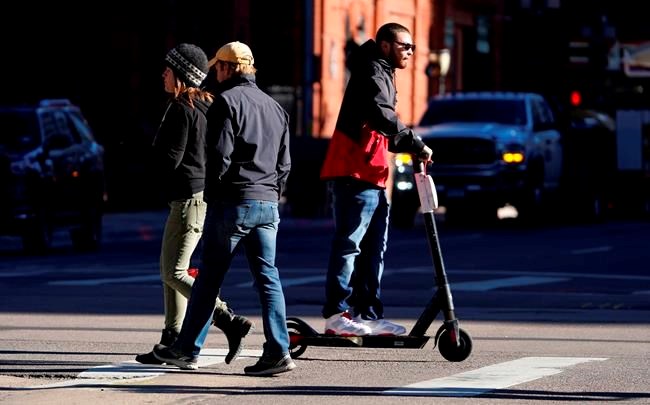VANCOUVER — A newly approved pilot project will allow electric kick scooters to legally cruise the streets and bike paths of six British Columbia municipalities.
Transportation Minister Rob Fleming said Tuesday the pilot project is all about looking at emerging forms of transportation.
"E-scooters are growing in popularity, they're not terribly well-suited for sidewalks and pedestrians," he said. "They're much more like an e-bike, but the Motor Vehicle Act has not contemplated the emergence of this new choice."
Fleming said one of the main goals of the pilot is to reduce greenhouse gas emissions.
The B.C. Motor Vehicle Act doesn't allow transportation such as electric scooters on roads or sidewalks, but a 2019 amendment permits communities to work with the province on pilot projects.
The six participating municipalities where e-scooters will soon be legal are Kelowna, Vernon, Vancouver, West Vancouver and North Vancouver city and district.
Before electric kick scooters can be legally used on municipal roads in these communities, the local governments must first pass their own bylaws, specifying where these devices will be used.
"We all want to move safely and efficiently from place to place. It's time to modernize how we move to and through communities, otherwise we will see significant impacts on our health, economy and environment," said City of North Vancouver Mayor Linda Buchanan in a statement.
The e-scooters will be treated like e-bikes, where a driver's licence or insurance won't be needed but riders must be at least 16, wear a helmet and follow the rules of the road.
Dates for the passage of local bylaws haven't been set, but Mayor Kennedy Stewart says Vancouver aims to begin a trial of privately owned devices like e-scooters later this year.
Olivia Yau, the co-founder of Vancouver electric scooter dealer Urban Machina Inc., said they've been advocating for the last few years for the changes.
Yau said there were few electric scooters on the road when the company started about five years ago, but they have now become popular methods of getting around.
"Bus stops, SkyTrain stations aren't everywhere," she said. "Scooters) bridge the gap where there's no transit options."
Fleming agrees with Yau's assessment, adding that the pilot project could have a large impact on the future of transportation planning.
"It could be a huge win for transportation planners, just in terms of reducing congestion and shifting people to more active transportation modes," he said.
The project requires little funding, as those riding the scooters will primarily use infrastructure that has already been built, Fleming added.
Ontario started a similar five-year pilot project in January 2020, allowing municipalities permit electric scooters.
However, a Toronto city staff report released last June cautions that there's a need for improved industry standards for consumers for both the purchase and use of the e-scooters.
Those issues, combined with a lack of enforcement resources, create a safety risk to riders and the public on streets and sidewalks, the report says.
This report by The Canadian Press was first published March 23, 2021.
Nick Wells, The Canadian Press




